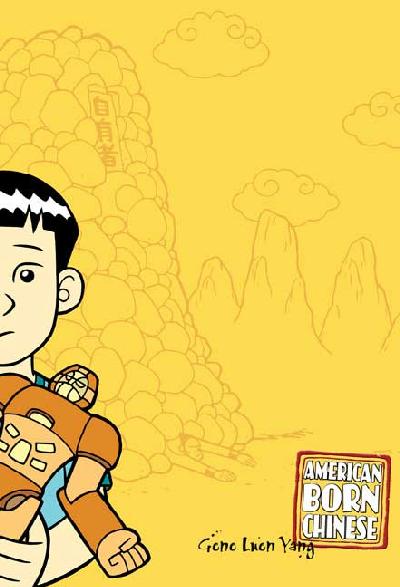 Too many people view graphic novels as a genre, rather than a format. Too often, they are associated with super heroes, or more recently, Japanese manga characters. Only recently have we seen the medium start to receive the critical respect it so richly deserves.
Too many people view graphic novels as a genre, rather than a format. Too often, they are associated with super heroes, or more recently, Japanese manga characters. Only recently have we seen the medium start to receive the critical respect it so richly deserves.American Born Chinese, by Gene Luen Yang, is one such example of an illuminating and often heart-breaking story told in a manner once described by Will Eisner as "sequential art."
ABC begins as three separate parallel narratives that eventually intertwine themselves into one cohesive strand by the stories end. One is relatively realistic, the other is very fantastical, and the third is satirical, often gut-wrenchingly so.
The main story describes the life of Jin Wang, the "American Born Chinese" boy of the title. He lives in Sn Francisco, and despite the fact that he was born there, is treated as foreign and different by his classmates. When another student from Taiwan, Wei-Chen Sun, joins his fourth grade class he initially does not want to be associated with someone so "FOB" (Fresh Off the Boat). However, they bond over their mutual love of transforming robots and end up becoming best friends with each other. Their friendship grows throughout the story which follows the boys from elementary to high schools.
Jin really wants to fit in with his other classmates, while Wei-Chen remains a tie to his Chinese heritage. This remains a powerful theme throughout ABC: How can an individual exist in between such separate and distinct worlds? Is it possible to exist in one world while at the same time remaining true to or honoring another?
Over time, Jin comes to resent his Chinese heritage, until he remembers the words an old shopkeeper told him when he was a boy, "It is easy to become anything you wish, so long as you are willing to forfeit your soul." In this case what Jin wants is to be American, which in this book means Caucasian, white. Jin has never been treated as an American despite the fact that his citizenship is just as valid as that of his classmates.
Yang has wonderful and thought-provoking things to say about what it means to truly be "American" in the 21st century. It is sometimes very easy to forget that barring American Indians, America is a nation of immigrants, and it is our diversity and our core values of acceptance and tolerance that make us such a great nation. We don't often see these American ideals trumpeted in this day and age of jingoistic, and xenophobic "patriotic" fervor.
The second narrative tells the story of the Monkey King, ruler of the Flower Fruit Mountain, and master of all 12 disciplines of Kung Fu (including the particularly awesome "Hair into Clones" where one can turn strands of hair into clones of oneself). When he is denied entrance to a dinner party in Heaven because he is a monkey, he sets about changing his ways. He begins to wear shoes, he changes his size, and forces his subjects to do the same. In other words, her rejects his heritage in order to try and gain acceptance from another group. Sound familiar? Good, I don't think the parallels between the Monkey King's story and Jin's are a coincidence.
The final narrative takes the form of a television sitcom complete with laughter and applause tracks. It tells the story of Danny, an All-American boy who must deal with the social horrors of the frequent visits by his cousin Chin-Kee. Chin-Kee is a horrifying amalgamation of just about every negative Chinese stereotype you can think of: he has slanted eyes, buck teeth, he switches his "r" and "l" sounds, he eats cats and dogs, he wears a coolie hat, and, unsurprisingly, he is a master of Kung Fu. However, he is enthusiastic and kind, only wanting to have fun with his cousin and experience American society. Danny, of course, is mortified. Chin-Kee's actions guarantee that he will remain a pariah in the harsh social landscape of high school. The struggle between Danny's All-American hopes and dreams and Chin-Kee's stereotypical buffoonery mirror Jin's internal struggle in the realistic narrative. Chin-Kee serves as an example of not only how other students view Chinese culture, but how Jin himself views his culture when it is seen through the lens of American society.
I would do Yang a grave disservice to reveal how ably he weaves these stories together in the end, but I will echo the back of the book: "Three very different characters. One Simple Goal. To Fit In." American Born Chinese is a brave book that challenges the reader to acknowledge that racism exists, even in 21st century America, even in forms that you might not immediately recognize.
American Born Chinese was the first graphic novel to ever be nominated for a National Book Award, and it won the American Library Association's Printz Award for excellence in young Adult Literature.
Check out Gene Yang's website here: http://www.humblecomics.com/
I especially like the Monkey King section, who he describes as "Sun Wukong, the Monkey King, is probably the most beloved fictional character in the Eastern world. He's like the Asian Mickey Mouse, only without the squeaky voice and corporate sponsorship."
3 comments:
It is a interesting blog! Can't wait to get my hands on it!
I love this book so much!!!!!
Actually, Wei Chen wants to stick to his Taiwanese heritige, which differs from Chinese. Nice overall blog, though.
Post a Comment